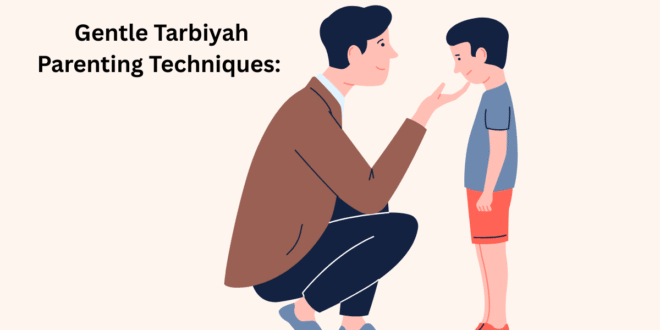Raising Children with Love, Wisdom, and Faith
Dr. Muhammad Younus Khalid- Tarbiyah Parenting Coach & Consultant
Parenting is one of the greatest responsibilities given to human beings by Allah (SWT). It is not merely about providing food, shelter, and education, but about nurturing the soul, mind, and character of a child. In today’s fast-paced world, many parents struggle between being too strict or too lenient. The Qur’an and Sunnah guide us to a balanced approach, which we call Gentle Tarbiyah Parenting.
This article explores the gentle Tarbiyah parenting techniques that combine Islamic principles with modern child psychology. It will help you raise children who are confident, obedient to Allah, emotionally balanced, and successful in both worlds.
What is Gentle Tarbiyah Parenting?
The word Tarbiyah comes from the Arabic root Rabb, which means nurturing, developing, and helping something grow to its full potential. In parenting, Tarbiyah refers to raising children holistically, spiritually, emotionally, intellectually, and physically, while guiding them towards righteousness.
Gentle parenting, on the other hand, is a modern concept emphasizing kindness, empathy, respect, and understanding. When combined with Tarbiyah, it creates a powerful Islamic framework for parenting that is firm but loving, disciplined yet compassionate.
Gentle Tarbiyah Parenting is the art of raising children through love, empathy, and consistent guidance while nurturing their faith, character, and skills to live as strong Muslims and responsible members of society.
Why Gentle Tarbiyah Parenting is Important Today
Today’s parenting challenges are very different from those of previous generations. Children are exposed to:
- Screens and social media from an early age.
- Peer pressure and bullying at school.
- Confusion about identity due to global influences.
- Weakening family bonds because of busy lifestyles.
If parents adopt only harsh, authoritarian methods, children may become rebellious or emotionally distant. On the other hand, overly permissive parenting leads to spoiled, undisciplined kids.
Gentle Tarbiyah parenting offers a middle path by:
- Building deep emotional connections with children.
- Teaching self-discipline instead of forced obedience.
- Strengthening a child’s Islamic identity and values.
- Equipping them with critical thinking skills to navigate the modern world.
Core Principles of Gentle Tarbiyah Parenting
To implement gentle Tarbiyah parenting techniques effectively, parents must first understand its core foundations:
-
Love and Mercy (Rahmah)
Allah (SWT) describes Prophet Muhammad (ﷺ) as a mercy to the worlds (Surah Al-Anbiya, 21:107).
The Prophet (ﷺ) was extremely loving and gentle with children. He played with them, greeted them warmly, and showed affection openly.
Practical tip:
Hug your child daily, speak kindly, and make them feel valued.
A child who feels loved will naturally be more receptive to guidance.
-
Consistency with Boundaries
Gentle parenting does not mean no rules. In Islam, boundaries are essential for a healthy upbringing.
The Prophet (ﷺ) said:
“Every one of you is a shepherd, and every one of you will be asked about his flock.” (Bukhari & Muslim)
Set clear, age-appropriate rules for behavior, but enforce them calmly and consistently, without shouting or humiliation.
-
Positive Role Modeling
Children learn more from what they see than what they hear.
Parents must model the values they wish to instill:
- Honesty
- Patience
- Salah (prayer)
- Gratitude
- Respect
When children see you praying regularly, speaking truthfully, and handling stress gracefully, they will naturally adopt these qualities.
-
Active Listening and Empathy
One of the most powerful gentle Tarbiyah parenting techniques is listening.
When a child feels heard, they develop self-worth and emotional security.
Tip: When your child shares a problem, don’t immediately correct or judge.
Listen first, acknowledge their feelings, and then guide them toward solutions.
-
Focus on Faith and Identity
Strong Islamic Tarbiyah helps children stay grounded amidst modern challenges.
- Teach them the stories of prophets and companions to inspire faith.
- Make Salah and Quran recitation a family habit.
- Encourage them to ask questions about Islam and explore answers together.
A child with a strong Islamic identity will be more resistant to negative peer pressure and cultural confusion.
Top Gentle Tarbiyah Parenting Techniques
Here are proven strategies you can implement step-by-step to practice gentle Tarbiyah parenting effectively:
-
Connection Before Correction
Before correcting misbehavior, connect emotionally with your child.
Example:
Instead of shouting,
“Why did you hit your brother?”
try saying,
“I see you’re upset. Let’s talk about what happened and how we can fix it.”
This approach:
- Builds trust.
- Reduces resistance.
- Encourages problem-solving.
-
Use Positive Language
Avoid negative phrases like:
- “You’re always naughty.”
- “Stop being lazy.”
Replace with constructive statements:
- “Let’s try again together.”
- “I believe you can do better.”
Positive language boosts a child’s self-esteem and motivates them to improve behavior willingly.
-
Gentle Discipline Instead of Harsh Punishment
Harsh punishments may stop misbehavior temporarily but damage the parent-child relationship long-term.
Gentle discipline techniques:
- Logical consequences: If a toy is misused, it’s put away for a day.
- Natural consequences: If they forget their homework, they face the teacher’s reaction.
- Problem-solving together: Ask, “What can we do differently next time?”
-
Storytelling for Moral Lessons
Children love stories. Use Islamic stories and personal experiences to teach values like honesty, patience, and gratitude.
Example:
Tell the story of Prophet Yusuf (AS) to teach resilience and forgiveness.
-
Create a Positive Home Environment
Your home should be a safe haven where children feel secure and loved.
Ideas:
- A special family dua corner for spiritual bonding.
- Regular family meetings to discuss feelings and plans.
- Limiting screen time and replacing it with quality family activities.
-
Encourage Independence
Allow children to make age-appropriate decisions.
This builds confidence and problem-solving skills.
Example:
- Let them choose between two healthy breakfast options.
- Involve them in small household responsibilities.
-
Daily Spiritual Routine
Integrate faith naturally into daily life:
- Recite short Quranic verses before bedtime.
- Say Bismillah before meals together.
- Share a daily gratitude moment during family time.
Common Challenges in Gentle Tarbiyah Parenting
Even with the best intentions, parents may face obstacles:
-
Lack of Patience
Gentle parenting requires calmness, which is difficult when parents are tired or stressed.
Solution: Practice self-care, make dua for patience, and remember parenting is an act of worship.
-
Balancing Authority and Gentleness
Some parents struggle to be firm without being harsh.
Solution:
Clearly explain rules and consequences beforehand, then follow through calmly.
-
External Influences
Peer pressure, media, and relatives may contradict your parenting style.
Solution:
- Build a strong family identity.
- Explain your parenting choices politely to others.
- Teach children critical thinking to evaluate external messages.
Tips for Success in Gentle Tarbiyah Parenting
- Start early: The earlier you begin, the easier it is to build habits.
- Be consistent: Children thrive on routine and predictability.
- Make dua regularly: Ask Allah (SWT) to guide you and your children.
- Keep learning: Attend parenting workshops and read Islamic parenting books.
- Focus on progress, not perfection: Gentle Tarbiyah is a journey, not a destination.
Conclusion
Gentle Tarbiyah Parenting Techniques offer a holistic, faith-based approach to raising children in today’s complex world. By combining love, mercy, and firm guidance, parents can nurture not only their children’s behavior but also their hearts and souls.
Remember, your role as a parent is one of the most honored responsibilities in Islam. Every smile you give, every dua you make, and every moment of patience you show is a step toward building a righteous generation and earning Allah’s pleasure.
“Our Lord, grant us from among our wives and offspring comfort to our eyes and make us an example for the righteous.” (Surah Al-Furqan, 25:74)
With consistent effort, reliance on Allah, and gentle Tarbiyah parenting techniques, you can raise children who are strong in faith, kind in character, and successful in both worlds.
 Edutarbiyah English Blog of Parenting and Tarbiyah
Edutarbiyah English Blog of Parenting and Tarbiyah



